
The use of manure as fertilizer is an essential ingredient of organic farming, and certified organic farming is definitely trending upwards in North America as consumers worldwide become more conscious of how their food is grown.
The use of manure as fertilizer is an essential ingredient of organic farming, and certified organic farming is definitely trending upwards in North America as consumers worldwide become more conscious of how their food is grown.
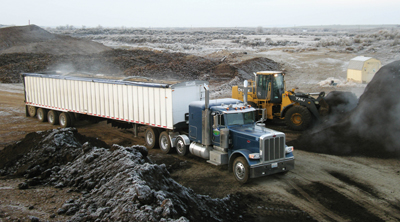
|
| The security of a consistent supply of manure for fertilizer is helping Cascade Agronomics build its customer base among both organic and conventional farmers. Submitted photos
|
The Research Institute of Organic Agriculture and International Federation of Organic Agriculture Movements report that almost 5.4 million acres are managed organically in North America, representing just over 12,000 farms. The U.S. organic industry grew by 21 percent in sales in 2006, and is forecast to experience 18 percent sales growth each year between 2007 and 2010.
Over 64,000 acres were managed organically in Washington state in 2007 and it was ranked second in the value of farm gate sales at about $160 million, second only to California.
Washington-based custom manure applicator Cascade Agronomics Inc. has grown right along with the trend toward more organic farming. The company was established in 2002 and now has 40 employees. It applies about 300,000 dry tons of manure per year, in addition to providing products and services related to commercial fertilizer, chemicals and seeds to the agriculture industry.
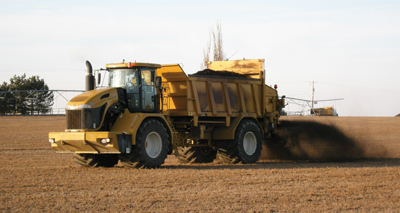 |
|
| Cascade Agronomics’ TerraGator nutrient management system units give the company precise control over its dry manure application service. |
|
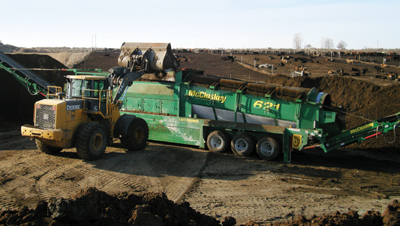 |
|
| Manure from feedlots is processed through a McCloskey trommel screen to remove rocks and debris before it is applied to farmland by Cascade Agronomics. |
|
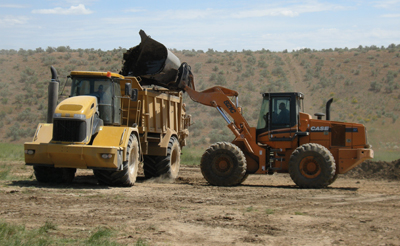 |
|
| Cascade Agronomics applies manure to about 50,000 acres of farmland annually, and 5,000 acres are for organic growers. |
|
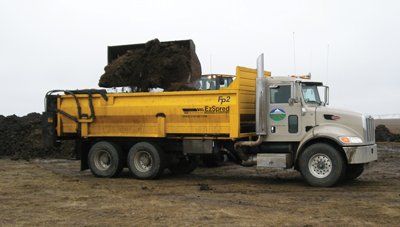 |
|
| Trucks with manure spreader boxes provided by FSI Fabrication are an important component to the Cascade Agronomics custom manure application fleet. |
It applies dry manure to about 50,000 acres per year, with 5,000 acres being organic farmland. While the company has found a niche, it takes more than just being in the right place at the right time to achieve business success. Passion and knowledge are also important ingredients.
“The reason I feel pretty good about what we are doing is two things,” says company owner, Todd Hines. “We are saving our customers money along with improving the soil health, and secondly, we are eliminating contaminants in the stockpiled (cattle manure) area. That makes me feel good as a person. I am trying to make a difference for the environment.”
Because the company has been able to demonstrate good results in terms of nutrient intake from its manure application service, more of its customers are using manure as a commercial fertilizer replacement.
“I have actually crossed over from the organic to a lot of our commercial growers,” Hines says, “because of the benefits I have seen from the manure on our organic crops, the health of the soil, and all the benefits of applying manure.”
He says a client will typically use manure on one cropland circle one year, more acreage the second year, and the entire field or all of their fields by the third year.
“Our customers are actually excited about the difference they are seeing in their soil health, crop responses, and increased water holding capacity,” says Hines. “There are a number of benefits our growers are realizing. I think that it has been a win-win situation for both our company and our customers because the cost of the manure has actually been less to obtain the same nutrients when factoring in the cost of commercial fertilizer over the last two years.”
Customers are also feeling more comfortable about manure as a fertilizer, knowing that there is a local inventory when faced with volatile commercial fertilizer prices, shortages and delivery issues.
Hines is an agronomist with a bachelor’s degree in crop management from the University of Idaho. His business is headquartered in the Moses Lake area, about halfway between Seattle and Spokane.
Common crops grown in the area include potatoes, onions, green peas, carrot seed, onion seed, alfalfa and wheat. There are also a lot of fruits, such as apples, cherries, and wine grapes, grown in the region. This has motivated Hines to expand into certified compost production for use in orchards.
The service provided by Cascade Agronomics essentially boils down to taking a soil sample, discussing an application plan with customers, deciding on the type of manure, finding sources of manure to meet customer needs, screening it through a McCloskey 621 trommel screen (in the case of cattle manure), and then applying the manure according to the customer’s nutrient management plan. The company applies both chicken and cattle manure, with the vast majority being the latter, given the number of intensive livestock operations in that area of Washington. Some of his suppliers are large feedlot operators like El Oro Cattle Feeders near Moses Lake as well as Beef Northwest Feeders. Cascade Agronomics also takes on contracts with individuals who have old feedlots that need cleaning up.
“Most of the guys we deal with are focused on their animal performance,” says Hines. “Obviously, if we get the manure out of there, they are going to have enhanced animal performance. It also looks better for the general public to have a clean feed yard versus one that has stockpiled manure everywhere.”
He adds that his contract suppliers also appreciate that they have someone who is going to be available on a consistent basis to purchase the manure, so it is one less concern on their plate.
There is a definite difference between applying chicken manure versus cattle manure.
“I only use the chicken manure on our organic crops,” says Hines. “That’s primarily because we are going after the nitrogen content in the chicken manure, which is roughly at 50 to 70 pounds of nitrogen per ton. Our use rates are typically in the five to seven ton per acre range.”
With cattle manure, he says they typically spread between seven and 30 tons per acre using screened material, but in that case, customers are primarily trying to capture the phosphate and potassium.
The company’s experience in terms of application rates and results is a valued service that keeps customers satisfied and coming back.
“We use different rates for different crops,” says Hines. “I have figured out what they are by trial and error, quite honestly. Based on that knowledge, I can make a recommendation based on the soil and what the crop use will be.”
Sometimes, it means going that extra mile to keep a customer happy. For example, to ship organic products to the European Union (EU), it was decreed that organic farmers cannot use manure from confined livestock operations. So, the company has to source cage-free chicken manure just so those customers can maintain access to the important EU market.
Cascade Agronomics’ fleet consists of two Ag-Chem 9205 TerraGator nutrient management system (NMS) units, a TerraGator 3244 with a nutrient management system, and a 3104 TerraGator nutrient management system unit. The company also has five 10-wheeler trucks with beater boxes supplied by FSI Fabrication – located in Sunnyside, Wash. – on the back to spread manure.
Hines says he chose the Ag-Chem TerraGators because of the consistently uniform application quality he achieves with these purpose-built units. The systems within the manure applicators are highly integrated, from the load cells to the auto-steer feature to the rate controller.
“The TerraGators come equipped with the Falcon VT Rate Controller,” says Hines. “If we wanted to, we could do variable rate application.”
While the TerraGators are built for manure application, Cascade Agronomics also offers a lime application service and is able to use the TerraGators for this service as well. In this case, the company does use the variable application rate feature.
Hines says having this level of precision is what has helped to differentiate his business from his competitors.
“There are a few guys that have pull-type spinners that they use,” he says, “but to my knowledge, they don’t have anything with load cells on them and I don’t think the uniformity of the application is as good as what our machines do.”
For example, he says that to make sure they don’t have overlaps or skips, they have auto-steer on all their machines. The operator simply sets a line when he starts the field, hits a button, and the TerraGator steers itself going through the field.
Hines adds the TerraGators also deliver outstanding performance when applying the chicken manure, which he describes as sometimes having the sticky consistency of Play-Doh.
“As far as the really wet chicken manure, there is no other spreader that I have seen that will do the kind of the job that the TerraGators with the dry NMS on them will do,” says Hines.
Their busiest time of year is in the autumn, before fall tillage or if any top dressing is going to be done on alfalfa or grass crops. Applying at this time gives the customer an opportunity to run water over the manure so that the nutrients penetrate the soil before winter.
The busy fall season has also factored into the company’s expansion plans, as it is a fairly short application window. Cascade Agronomics plans to purchase another TerraGator 9205 with NMS to meet demand and to expand its service area.
The company also has expansion plans into certified organic compost.
“Part of the reason behind that is for tree fruit,” says Hines. “It goes back to growing organic and the EU. They want growers to have certified compost on certified organic crops, so that is why we are adding it to our business."